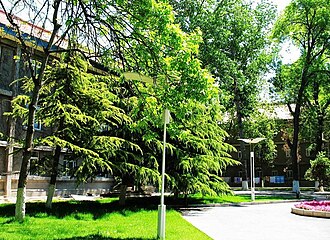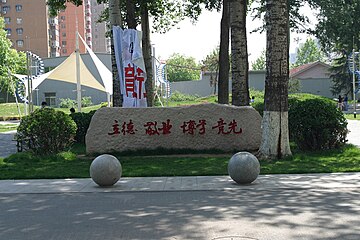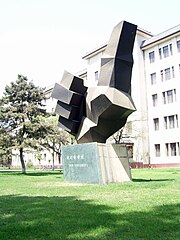Communication University of China
中国传媒大学 | |||||||
| File:Communication University of China logo.png | |||||||
Former names | Beijing Broadcasting Institute (1959–2004) | ||||||
|---|---|---|---|---|---|---|---|
| Motto | 立德、敬业、博学、竞先 (Chinese) | ||||||
Motto in English | Integrity, Professionalism, Erudition and Competence | ||||||
| Type | National | ||||||
| Established | 1954 | ||||||
| President | Liao Xiangzhong | ||||||
Academic staff | 1115 | ||||||
| Students | 14,623 | ||||||
| Undergraduates | 9452 | ||||||
| Postgraduates | 5171 | ||||||
| Location | , China 39°54′33″N 116°33′01″E / 39.909106°N 116.550162°ECoordinates: 39°54′33″N 116°33′01″E / 39.909106°N 116.550162°E | ||||||
| Campus | Urban, 46.37 ha (114.6 acres) | ||||||
| Website | en | ||||||
| Chinese name | |||||||
| Simplified Chinese | 中国传媒大学 | ||||||
| Traditional Chinese | 中國傳媒大學 | ||||||
| |||||||
The Communication University of China (CUC) (Chinese: 中国传媒大学) is a leading public university in Beijing. It is one of the China's key universities of 'Double First Class University Plan', directly administered by the Ministry of Education of the People's Republic of China. CUC developed from what used to be a training center for technicians of the Central Broadcasting Bureau that was founded in 1954. In April 1959, it was upgraded to the Beijing Broadcasting Institute (BBI) (Chinese: 北京广播学院; pinyin: Běijīng Guǎngbō Xuéyuàn) approved by the State Council. In August 2004, BBI was renamed Communication University of China. CUC is located in the eastern part of Beijing near the ancient canal, which occupies 463,700 square meters of land and a total of 499,800 square meters of buildings.[1]
History
CUC's history dates back to March 3, 1954, when the first training class for broadcasting professionals was held by the then Central Radio Administration. This then led to the founding of Beijing Broadcasting College in 1958. On September 7, 1959, CUC's precursor Beijing Broadcasting Institute (BBI) was established. During the ensuing four decades, BBI remained a relatively small college and only known among the circles of Chinese media professionals.[citation needed]
On August 19, 2004, the State Council of the People's Republic of China approved the renaming of the institute to the Communication University of China. It has now developed into a comprehensive institute of higher learning with broadcasting, film production, journalism, drama, animation, advertising, newscasting, creative cultural industry, Communications engineering, foreign languages (especially minority language), management and media law education as its major academic disciplines.[2]
Academics
Overall academic situation
CUC upholds its ideology of offering courses that are centered on scientific based learning by emphasizing the application of a course and relevance to the particular discipline. As a result, an inter-relating and inter-influencing discipline system that covers journalism and communication, film and television arts, information science and technology, literature, engineering, management, economics, and law and science has been formed. There are currently six faculties that consist of one co-innovation center and five directly affiliated schools, which comprise two national key disciplines (journalism and radio and television arts). There is also one national key cultivation discipline (communication), three Beijing municipal key disciplines (journalism and communication, art theory, theater film and television), four Beijing municipal key subordinate disciplines (linguistics and applied linguistics, communications and information systems, electromagnetic field and microwave technology, animation), seven post-doctoral research centers, seven doctoral programs, 35 doctoral programs (subordinate disciplines), 18 master programs, 95 master programs (subordinate disciplines), 8 professional master categories, and 84 bachelor programs.[3]
Faculties and schools
Faculty of Journalism and Communication
- TV School (From 2004 to 2013, TV School and the School of Journalism were temporally merged into the School of Television and Journalism.)
- School of Journalism
- Institute of Communication Studies
Faculty of Art
- School of Film and Cinematic Arts
- School of Animation and Digital Arts
- School of Music and Recording Arts
- School of Presentation Art
- Institute of Art
- Art Education Center
Faculty of Science and Technology
- Information Engineering School
- School of Science
- School of Computer Science
- Experimental Teaching Center
Faculty of Literature and Law
- School of Literature
- School of International Studies
- School of Teaching Chinese as Foreign Language
- Sports Department
Faculty of Advertising, Economics and Management
- Advertising School
- School of Economics and Management
- Business School
- Culture Development Institute
Communication Strategy of China Co-innovation Center
- New Media Institute
- Institute of Media Science
Faculty of Continuing Education
- School of Distance Learning and Continuing Education
- School of Executive Education and Professional Training
- Vocational and Technical School
- Academy of Media and Public Affairs
- Phoenix School
Independent Schools and Departments
- School of Government and Public Affairs
- School of Marxism
- International Communication University of China (ICUC)
- Computer and Network Center
- Practical and Experimental Teaching Center (CUCTV)
Confucius Institutes
Communication University of China has co-established three Confucius Institutes for providing Chinese language and cultural education for learners outside of China.
- Belgrade Confucius Institute (in cooperation with University of Belgrade, Serbia)
- Groningen Confucius Institute (in cooperation with University of Groningen, Hanze University of Applied Sciences Groningen, and the Municipality of Groningen.)
- Confucius Institute at Federal University of Rio Grand Do Sul (in cooperation with the Universidade Federal do Rio Grande do Sul, Brasil)
Modern foreign languages teaching
Communication University of China is one of the officially-sanctioned important base in China for teaching foreign languages and especially narrowly-used languages. So far, CUC has successively offered 32 Bachelor's programmes in modern foreign languages since its establishment.[4] Some of programmes recruit students irregularly every few years according to admission plans sanctioned by the Ministry of Education. CUC is still the only university in China to offer Bachelor's programmes in Bengali, Tamil, Pashto and Esperanto. English (since 1958), Spanish (since 1959), French, Russian, German, Japanese, Korean, Portuguese (since 1960), Italian (since 1960), Hindi (since 1965), Bengali (since 1964), Nepali (since 1964), Assamese (since 1965), Urdu (since 1962), Tamil (since 1959), Sinhalese (since 1965), Pashto (since 1964), Persian (since 1988), Zulu (since 1965), Swahili (since 1960), Esperanto (since 1959), Turkish (since 1959), Swedish, Hausa (since 1965), Malay, Hebrew, Greek (since 1964), Hungarian, Dutch (since 1965), Laos (since 1965).[5]
There is a Center for Portuguese Studies (originally, Centro de Língua Portuguesa Dr. Stanley Ho) under a Cooperation Protocol between CUC, Camões Institute (Portugal) and IPOR (Macau) since 2005.[6]
Rank
Communication University of China is widely regarded as one of the most competitive universities for admission in China.[7][8][9]
In September 2017, CUC was selected as one of 140 Double First Class University Plan universities approved by the Ministry of Education.[10]
In the fourth round of China University Subject Rankings (CUSR) by the Chinese Ministry of Education in 2018, Communication University of China ranked first in mainland China with its two disciplinary areas evaluated as A+ disciplines, including "Journalism and Communication" and "Drama, Film and Television Studies" and ranked third with A− in "Art Theory", tenth with B+ in "Design", 19th with B in "Fine Arts" in China.[11]
Campus location
CUC's 116.88 hectare main campus is located in Dingfuzhuang, eastern part of Chaoyang District, Beijing. It is just outside the Eastern 5th Ring Road, and is just along the Beijing-Tong County expressway. The campus is linked by the Communication University of China Station of Beijing subway Batong Line.
Affiliations
- Communication University of China Press
- Communication University of China, Nanjing
Established in 2004, CUCN is an independent private university in the southern city of Nanjing, Jiangsu Province. It is directly supervised by the board of directors, with CUC's former president as the honorary head of the board.
Notable alumni
Communication University of China is known for fostering media administrators, producers, journalists and TV presenters in China. Some of its notable alumni include:
Media administrators
- Liu Changle: Chairman of Phoenix Satellite Television based in Hong Kong.
- Wang Jiyan: VP of Phoenix TV Hong Kong and head of the Phoenix Chinese Channel.
- Yang Hongxin: Director of Xinjiang Television
Media celebrities
- Luo Jing, news presenter from China Central Television
- Cui Yongyuan, television host from China Central Television
- Bi Fujian, television host from China Central Television
- Chen Luyu, a Phoenix Television talk show host.
- Li Yong, television host from China Central Television
- Bai Yansong, news presenter from China Central Television
- Chai Jing, former journalist from China Central Television
- Chen Luyu, host from Hong Kong's Phoenix Television
- Zhang Haijie, news presenter from Singapore's MediaCorp Channel 8
- Chen Xiaonan, a Phoenix Television talk show host.
- Li Xiang, actress, television host and singer.
- Alex Man, Hong Kong actor
- Dong Zhen, singer-songwriter
- Sandra Ma, television and movie actress
- Zining, singer-songwriter, Rocket Girls 101's member
- Li Yi, narrator and voice actor.
- Fu Yaning, singer and actress
References
- ^ "Introducing CUC". en.cuc.edu.cn. Retrieved 2019-05-01.
- ^ "History & Tomorrow". Archived from the original on 18 November 2011. Retrieved 8 November 2011.
- ^ "Introducing CUC". en.cuc.edu.cn. Retrieved 2019-05-01.
- ^ "中国传媒大学本科招生网-专业介绍". zhaosheng.cuc.edu.cn. Retrieved 2019-05-02.
- ^ "===历届校友===". web.archive.org. 2017-07-22. Archived from the original on 2017-07-22. Retrieved 2019-05-02.
{{cite web}}: CS1 maint: bot: original URL status unknown (link) - ^ "Página oficial do Camões — Instituto da Cooperação e da Língua".
- ^ "用大数据告诉你2018年中国传媒大学将会有多难考". www.sohu.com. Retrieved 2019-05-01.
- ^ "国内最难考的10所大学,每年还有一大批人挤破脑袋都想进!". baijiahao.baidu.com. Retrieved 2019-05-01.
- ^ "2018年中国重点高校录取难度排名,就是这些学校最难考". www.sohu.com. Retrieved 2019-05-01.
- ^ ""双一流"建设高校和学科名单公布—新闻—科学网". news.sciencenet.cn. Retrieved 2019-05-02.
- ^ "China University Subject Rankings (CUSR)". www.chinadegrees.cn. Retrieved 2019-05-01.
External links
- CS1 maint: bot: original URL status unknown
- Coordinates not on Wikidata
- Articles containing Chinese-language text
- Articles using infobox university
- Articles containing simplified Chinese-language text
- All articles with unsourced statements
- Articles with unsourced statements from September 2018
- Commons category link is defined as the pagename
- Universities and colleges in Beijing
- AC with 0 elements
- Communication University of China
- Film schools in China
- Educational institutions established in 1954
- Mass media in Beijing
- 1954 establishments in China
- Media studies
- Schools in Chaoyang District, Beijing
- Plan 111








